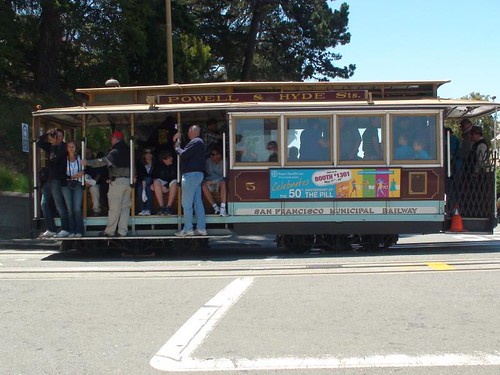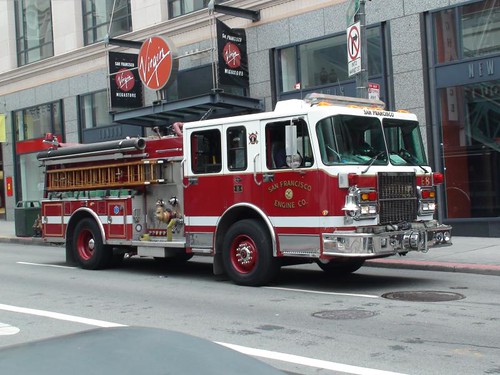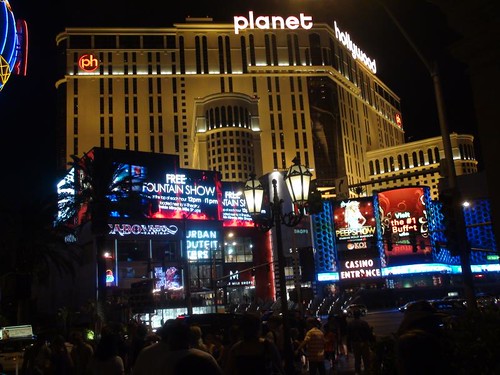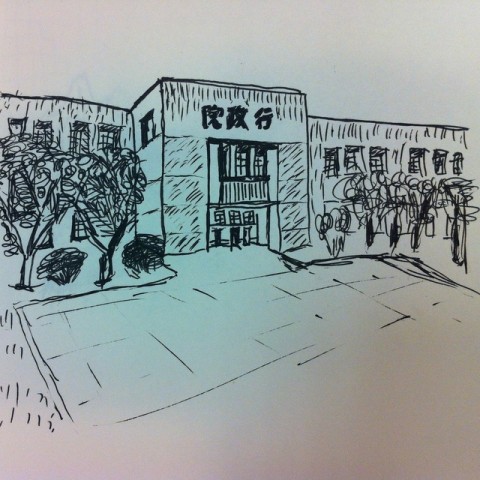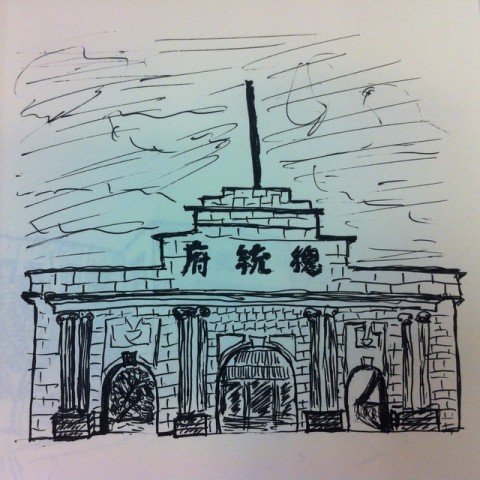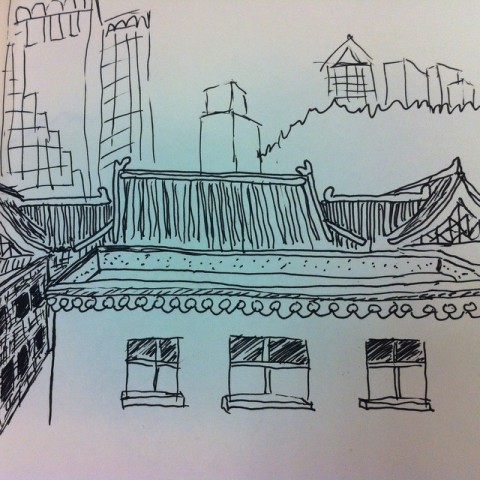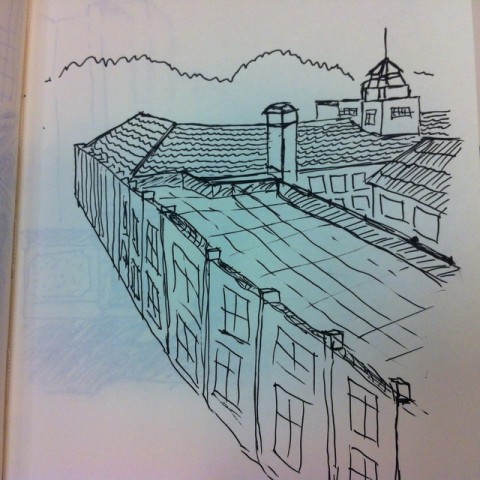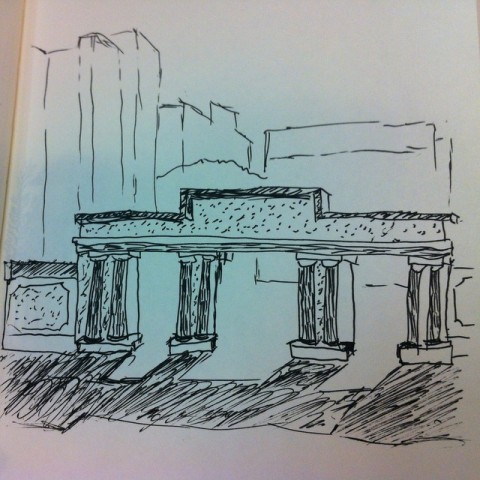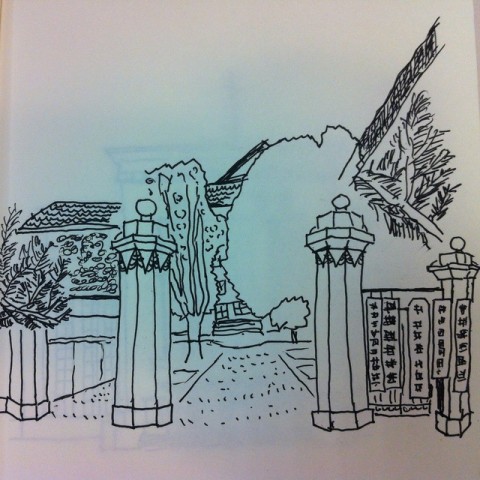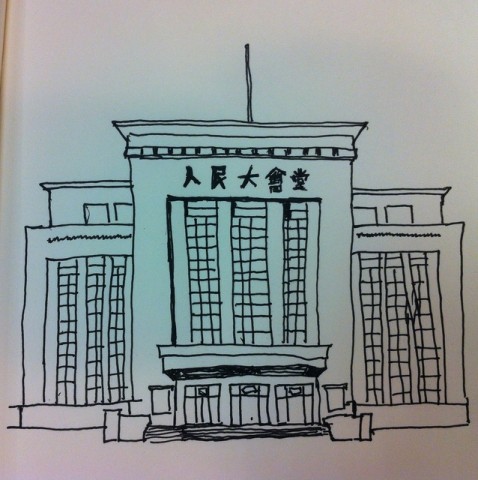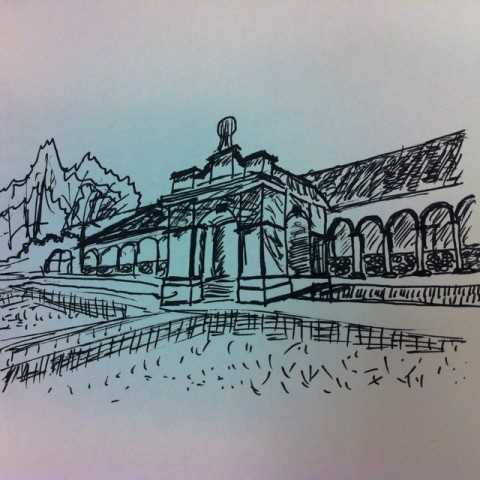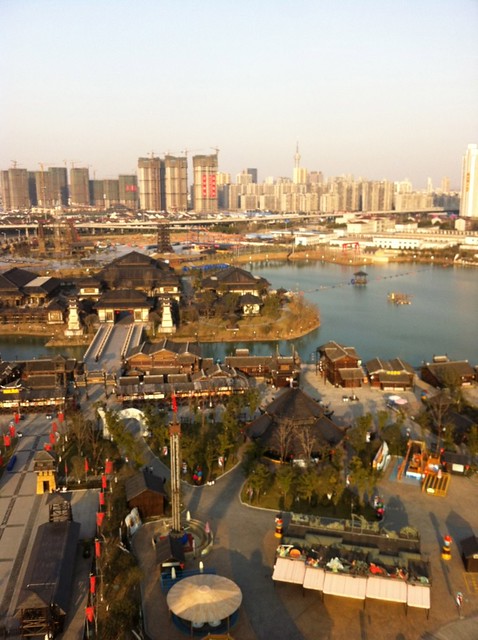I am packing to head to Nice via Paris. Great trip ahead. I am very excited to join the Cannes Festival of Creativity.
Category Archives: Travel
Flying to Puket
I am at Pudong airport and get ready to fly to Puket – my first trip to Thailand, and one of the few trips to southeast Asia.
Nanjing, the Capital of a Republic
A danger of travel is that we see things at wrong time, before you have the opportunity to build up the necessary receptivity so that new information is as useless and fugitive as necklace beads without a connecting chains. – Alan de Botton
This time, I visited Nanjing during the weekend, and I had some preparation to get the receptivity, and tried to use a connecting chain to guide what to see. The topic will be the government of Republic of China, a historical term in mainland China, and a current term in Taiwan.
I went to the following places:
- The presidential palace
- The Executive Yuan
- The Legislative Yuan
- The Judicial Yuan
- The Control Yuan
- The Exam Yuan
They are scattered into different places across the city, but to follow a path to visit every single one of them makes a great day.
Nanjing is a city with great histories. Many of the memories were painful, just like the feeling of Berlin. It is also moving very fast. I didn’t expect to see a building 450 meters high (due to my ignorance, I didn’t know that). Many years ago, I would say Hangzhou is a much better travel destination than Nanjing, and now I rediscovered the city and claim it to be better to spend a weekend than Hangzhou. Here is why.
- Nanjing is only 1:40 hour away from Shanghai. Hangzhou is less than 1 hour but the difference is not big.
- There are 70 G-trains between the two cities everyday, making it more convineint to get there. The fastest train is only 1 hour and 15 minutes.
- Nanjing was capital of 6 dynasties, and the recent Republic of China. There are a lot architect and stories there. Hangzhou is a little bit less “historical”
- Nanjing’s transportation is amazingly good. The two metro lines (one connects at the Railway station!) completely beats Hangzhou. It was nightmare to wait for taxi at Hangzhou railway station.
- In the recent years, Nanjing suddenly became more modern than Hangzhou, with some very nice shopping malls like Deji Plaza at Xinjiekou.
- The mountains of Nanjing is more approachable.
- For many people in Shanghai, Nanjing is obviously a less visited city than Hangzhou, so worth the time.
I will visit Nanjing soon during weekend. A weekend escape in Nanjing is just a very good experience for me – high-speed train, Hanting Hotel, plus Metro tickets are good package for me.
A Travel Document Just for Taiwan
People in China have to have a lot of documents, from the government.
Besides National ID, Residential Permit Booklet (Hukou Booklet), which everyone has, there are two special documents that are interesting.
One is Pass for Travel to Hong Kong and Macau. That is a special document with the same format and content as a passport, but just for travelling to Hong Kong or Macau. Mainlander still needs a visa, but it is politically incorrect to call it visa. It is a notation, and you have to get it before you travel.
The other document is Pass to Travel to Taiwan. That document is specially created for Taiwan travelers, with similar visa mechanism, although people don’t call it visa. The interesting point is, since mainland claim owner of the Taiwan, traveler need to get a visa from the local Entry/Exit Administration to be admitted to stay in Taiwan for 15 days (a claim of ownership), and submit the same document to Taiwan to get another notation. Anyway, although it is a very complicate process, at least there is a process for individuals to visit Taiwan.
These documents are chained one after another. With National ID, Resident Permit, and photo, you get Pass to Travel to Taiwan. With that, you get Taiwan Visa by China, and with that, you get Taiwan Visa from Taiwan. It takes about a month to get everything ready.
I am going to get one, and have it ready. The freedom to travel feels so good.
We Design Our Life, at Least for Travel
I met with many people during the trip, and many of them were so interested in China, so that they even sent their kids to Chinese language school, but they never went to China. I asked why, and they said, they were thinking about it. I always encouraged them to come to China – anyway, it is just 12 hours of plane ride away.
The interesting story of Two Monks’s travel story suggested that well preparation, and a lot of money does not guarantee a monk to get to Nanhai from Sichuan. The one who take action made it.
Related to this, I found it interesting to see how visa effectively prevent people in China to travel. We need visas to almost everywhere in this planet. This is the excuse many people, including myself, use not to travel. But the counter argument is, people in the States don’t need visa to most of the places (Well, they need it to come to China), they don’t travel as we thought. Taiwan is a new travel destination for some provinces in China, including Shanghai, but we don’t travel much often to Taiwan (at least for me). To zoom in to closer places. Tibet does not require visa, but I have never set foot there.
There are so many places in the world that I want to travel, but I didn’t have a clear plan for it, and there is no action to it. Sometimes we need excuse to push us there. I am so lucky to use board meeting as a driving force to go to the Silicon Valley every half year, and that is so rewarding for me and for the company.
There are many other things, like running a company. There must be a lot of things to do to run a company well, and to allow more freedom for the people in it and be more creative, and taking bolder approach. The decision is also on our hand, not others.
We can design our lives, at least for travel, and at least for immediate relationship around us.
Daylight Saving Time – My Way
During this west coast travel in the States, I started to think about daylight saving time (DST), in my own way.
The whole idea of daylight saving is, there are many more additional hours of daylight in summers than winters. Since we always define 12:00 as noon when the sun is at the highest position, there are two hours of more daylight in the morning, and in the evening.
The other fact is, people tend to extend activity to the evening, instead of morning. The evidence is, lighting (candles, or electronic) are most used at evening than in the morning. Most people just don’t wake up in the morning, lit the light, and do something. Modern activities, like movies, sports, entertainments, after work life, and even education tend to leverage the hours in the evening.
Based on the two facts that listed above, it makes sense to shift the clock and leverage the additional hours. There are two ways to do it. Either make morning longer by shifting the main time frame toward evening or make evening longer. Obvious the later is more promising.
So the way people do it is, adjust the clock clockwise by one hour.
To help me understand it easier, I would visualize it as “Follow Japan”. For example, today, the sun came out at around 5:06 AM. If we follow Japan, the new time would be 6:30 AM. The sunset for today is 6:57 PM, and it would be 7:57 PM – bingo! more time in the afternoon without affecting early raisers.
That sounds such a good idea, but it turned out that it does not help the energy saving that much as people thought. I am happy that China finally abandoned the confusing shifting. Why?
Actually, if you want, you can do it yourself. The basic idea is, in summer, the Sun is raising up earlier and earlier every day. When the sun started his work in the morning, you are still sleeping. If you just adjust the schedule and be up with the sun, you are running your own daylight saving time. Very few people realized that we can and should change our schedule according to the sun. Why always wake up at 8:00 AM? We can do it at 6:00 AM, which is identical to 8:00 AM in winters. I would take the chance of the early raiser habit jet lag gave me to try it out.
What We Can Learn from Travellers
Travel is a habit changer, and a mind changer. From time to time, I acknowledge the benefit of travel, and its positive impact on me.
Break the Boundary of Time
Travelers may have different sense of time than the residence. I waked up and wandered around the Bund at 5:30 am today, and saw many travelers – who else wake up so early to get to a tourism location? When I was in the valley, because we are running out of the daily schedule, 9:00 am is not that a sharp dividing line between pre-work to work. Sunday and Saturday are not that different, than work days.
Break the Boundary of Location
During travel, “far” places are much further than local people. A typical trip to China means Beijing/Shanghai/Xi’an/Guangzhou and maybe Chengdu for most foreigners, and for others, Tibet and Xinjiang are must visit for many American, which is still a dream for many people, including myself.
When you travel, since you have setup the orientation system for yourself, you may wake up and drive to places considered far-away. Driving down to Los Angelas does not sound too crazy to me, and driving across US is also attractive. In the area, a meeting in the City (San Francisco) can be arranged adjacent to a meeting in San Jose. That is just like arranging a meeting in Shanghai and Suzhou, and maybe another in Hangzhou. Totally crazy but I don’t feel anything wrong about it when I travel.
If you apply that to Shanghai, meeting in any of the district should sounds close, and you should do it.
Break the Reasons You Don’t See People
When I travel, I may just shoot an email to an old friend and tell him/her that I am in town and how about catch up? The only reason to catchup is because we haven’t seen each other for at least half year (my travel schedule). Visiting a place every half a week or a year is good interval since it is not too long that you barely accumulate any friend, or too short that you become a resident. The other party enjoy the same thing.
In Shanghai? That sounds a little bit awkward. You don’t see people just for the sake of seeing people (It IS a great reason), so people may stay away from each other without face to face time for many years. Sometimes I feel people in the city is further than people in the city.
Break the Balance Between Thinking and Doing
This is actually not just travel, it is vacation vs working time. In working time, most of the time, we are doing things. Doing is an important part of a company or person, but lack of thinking for too long can be a problem.
Travel is dedicated thinking time. Even people who swipe the street gets to think when they are travel. You talk with people – think! You see the street view – think! You check-in hotels – think! You are forced to think and react to the more unfamiliar world, and you think more.
This is one thing we definitely need to learn from the travelers.
Others
Surely there are many other aspects of travel itself – the culture immersion, the new skills you learn, but at the end of the day, you are still yourself, and the impact in how you behave is more important than the real knowledge.
How Many Times I Visited the Bay Area
I am asking myself the question:
How many times I visited the bay area?
I asked because I was asked, many times.
The first clue come from the United Airlines frequent flyer program. Although I don’t always fly United, it is a good place to get started. Then the blog posting is another very powerful way to trace back. Finally, combined with the US customer stamps on my passport, I basically have some idea.
The short answer is, 16 times in the silicon valley, plus few other trips to Seattle, Chicago, and New York. That is a lot in the last few years.
Nov 11, 2002
- Back to Shanghai from Seattle November 17, 2002
- Two Tall Buildings Outside my Window November 16, 2002
- Art? Art! November 15, 2002
- Is English Skill That Important November 14, 2002
- My Most Serious Jet Lag Ever November 13, 2002
- Autumn in Seattle November 12, 2002
- Flying over the Pacific November 11, 2002
Dec 06, 2004
- Taxi in New York City
- Flying and Flying… January 11, 2005
- M.I.T and Harvard
- Grassroot Art in Seattle January 6, 2005
- Things to Prepare for Visiting U.S. January 5, 2005
- Life in New York is Tough for Me
- Subways in New York January 4, 2005
- Skyscrapers in New York January 3, 2005
- Is the Real Estate Cooling Down?
- Heavy Snow in Shanghai January 1, 2005
- Cold New York December 28, 2004
- New York Pictures December 27, 2004
- Christmas Eve in New York City December 25, 2004
- Merry Christmas! December 24, 2004
- Chinatowns in U.S.
- At Harvard December 22, 2004
- It Snows in Washington D.C! December 20, 2004
- I am in Washington, D.C December 18, 2004
- New York – Day 2 December 16, 2004
- I am in New York December 15, 2004
- Chicago is Amazing December 13, 2004
- Hello Chicago December 12, 2004
- Back from Geek Diner in Bellevue December 10, 2004
- Art Story 2: Lion King in Paramount Theater December 9, 2004
- Art Story 1: Dale Chihuly and Shareton
- Incredible Prosperity of Art in Seattle
- Getting Shore Pass (Temp Visa) for Japan
- Dec 6 – The Longest Day in 2004 December 8, 2004
- Arrived in Seattle December 7, 2004
- Starting the Journey, Again December 5, 2004
- Rejected by ANA and Postponed Travel December 4, 2004
- U.S. Trip Update December 1, 2004
Apr 18 2005
- Thanks Everyone! April 28, 2005
- Sailing in the Bay April 24, 2005
- Meetup in San Francisco, CA
- The Silicon Valley Spirit is Back April 23, 2005
- I Meet Mena and Ben from Six Apart
- I Feel Like a Rabbit when I Eat Salad April 22, 2005
- When Jian Shuo Leaves his Car (in CA)
- Gift to Selim Freiha April 21, 2005
- Actual Speed of Maglev is 64 km/h April 19, 2005
- Trip to SFO April 18, 2005
Dec 05, 2005
- Weekend at San Jose December 12, 2005
- Hotmail Does Not Work December 10, 2005
- SFO Pictures December 9, 2005
- Jet Lag Patterns December 8, 2005
- In San Jose Already December 6, 2005
- Flying to SFO December 4, 2005
Jun 05, 2006
- Companies in Silicon Valley June 14, 2006
- We Need a Bridge, Seriously June 13, 2006
- 46A is the Best Seat on Boeing 747
- Flying back to Shanghai June 12, 2006
- High-Tech Companies in a Day June 11, 2006
- Hukou System in China June 10, 2006
- City in China = County in U.S. June 8, 2006
- San Jose Impression June 7, 2006
- Arrived at San Jose June 6, 2006
- Flying… June 5, 2006
Nov 09 2006
- Back to Shanghai November 20, 2006
- Heading Back to Shanghai November 18, 2006
- Sound Bytes of These Days November 16, 2006
- Mena’s Presentation on Ted November 15, 2006
- Three Services I don’t Use in China November 13, 2006
- A Private Message…
- University Ave Day November 12, 2006
- Chat with Tina and Jin November 11, 2006
- Missed the Lecture on Stanford
- Jet Lag? Finally Found Out the Cure
- My Lifeline on the Little Plastic Card November 10, 2006
- In San Jose from Nov 9 to Nov 18 November 9, 2006
Dec 03 2006
- Hello from San Jose, Dec 4 December 4, 2006
- Hello from Narita Airport, Tokyo December 3, 2006
- Jian Shuo Visits San Jose (Again) December 1, 2006
Sept 06 2007
- Baseball Game (San Francisco Giant v.s. Arizona Diamondbacks) September 16, 2007
- Six Apart Office in San Francisco
- Visit in Six Apart September 15, 2007
- Wrapping up My Trip in San Jose September 14, 2007
- Five Years of Blogging September 11, 2007
- Meetup in Palo Alto on Sept 9, 2007 September 8, 2007
- Pass-by the Cornfield in Sunnyvale September 7, 2007
- Trip Progress: Wake up Early in the Morning
- Geek Dinner in Sunnyvale
- Trip Progress: Arrived in San Jose
- Trip Progress: Pudong Airport September 6, 2007
- Heading to San Jose Tomorrow September 5, 2007
Sep 13, 2008
- Back from 22 Hours Trip
- Random Note During Meeting
- Different Ways to Waste Energy September 22, 2008
- Salsa Dance Place in Seattle September 21, 2008
- Jian Shuo Wang Becomes Wang Jian Shuo
- Photos from YLF Snoqualmie, WA
- Float Over the River of Snoqualmie September 20, 2008
- First Two Sessions of YLF 2008
- Only J (Not P) Survives in US
- I Decided to Learn to Read Menus
- I Now Prefer Inexpensive Hotels
- Dinner with Friends in Microsoft in Redmond September 18, 2008
- Finally Get into Buck’s Restaurant September 17, 2008
- Don’t Force Me to Write on Topics
- Surrounded by Negative News in US September 16, 2008
- Meetup in Google September 15, 2008
- Travel is a Habit Changer September 14, 2008
- Dinner in Downtown Mount View
- Call Back China from Abroad: **139*#
- Get to Airport Early is Important
- Starting the Longest Day September 13, 2008
Jul 02, 2009
- Back to Shanghai July 12, 2009
- My United Airlines was Cancelled July 10, 2009
- End of Noodle Trip
- Wrapping up my Trip in SV July 9, 2009
- I Just Love Silicon Valley July 8, 2009
- Got a Overtime Parking Ticket July 7, 2009
- Why Car Lights in US are Always On
- Inspiration is the Key in Silicon Valley July 6, 2009
- Tax Rate in China is Low? July 5, 2009
- Fireworks in Sillicon Valley
- Drawing of Stanfod July 4, 2009
- Morning America, and Good Night China
- United Airlines is Bad July 3, 2009
- Hello from Palo Alto
- Bye Bye Shanghai for Few Days July 2, 2009
- Checklist for US Trip July 1, 2009
Feb 20, 2010
- Wrapping up 2010 Winter Trip
- Jian Shuo Wang in Forbes March 2, 2010
- Skiing in Tahoe February 28, 2010
- Tsinghua & Jiaotong University Alumni Gather February 26, 2010
- I Should Not Open Nexus One at Night
- Met with Mark Zuckerberg of Facebook February 25, 2010
- Reported by New York Times
- I Bought Nexus One
- Street Names in America is Mystery – Part II February 24, 2010
- Busy and Excited
- Content Scattered on the Web
- The Hills of Sillicon Valley is GREEN
- Building Safty by Increasing Vulnerablity February 23, 2010
- US Visa is Simple to Get
- How Stupid I am Not Knowing Priceline
- Google Reader Support PubSubHubbub February 22, 2010
- Learnt What Open House is
- Hotel Searching Experience February 21, 2010
- Why Restaurant’s Menu is Printed Daily?
- Street Names in America is Mystery
- Hello From Palo Alto
- PVG to SFO in Febuary February 19, 2010
Jul 05, 2010
- Lake Tahoe Photo of Me (Some kind of) July 31, 2010
- Grand Canyon Photos July 30, 2010
- Do Travelers Feel People are More Friendly? July 29, 2010
- Why People Travel July 28, 2010
- The Roads in the West July 27, 2010
- Aspen Airport Photos July 26, 2010
- Wrapping up the Summer Trip in US July 25, 2010
- Second Day of Fortune Brainstorm Tech July 24, 2010
- Fortune Brainstorm Tech #FortuneTech July 23, 2010
- Leaving for Aspen July 22, 2010
- More Perspective about US, and China July 21, 2010
- I Found a Las Vegas in Shanghai July 20, 2010
- San Diego July 19, 2010
- Route 66 and Interstate 40 at Seligman July 18, 2010
- Restart the Daily Blog July 17, 2010
- Reserved iPhone 4 at Apple Store July 7, 2010
- Jian Shuo is in Bay Area, Again July 6, 2010
Oct 13, 2010
- Timber Cove, Sonoma October 20, 2010
Why I barely wrote anything during this trip? It is because it is a very simple trip just to attend one meeting (YLF). From airport to meeting to airport type of trip.
Feb 08, 2011
- The Advantage of Traveler February 16, 2011
- Packing for Shanghai February 14, 2011
- Meet with Craig Newmark February 12, 2011
- Met with Adam D’Angelo and Charlie
- In Google and Facebook Today February 11, 2011
Jun 25, 2011
- Awareness of Time Zone July 7, 2011
- Never Squeeze Buffer Time for Travel July 4, 2011
- Why I WILL Return my MacBook Air July 3, 2011
- Why I Won’t Return my MacBook Air July 2, 2011
- I Bought Myself a MacBook Air June 30, 2011
- God is Favorable to People in Bay Area June 29, 2011
- Don’t Trust Travel Agencies June 28, 2011
- Hello from SFO June 26, 2011
- I am Going to Sillicon Valley June 25, 2011
Sep 27, 2011
- New York and a Memorial October 12, 2011
- Bye Bye Big Apple October 10, 2011
- New York is not the City For Me October 9, 2011
- Courage
- NASDAQ, Bloomburg, NCUSCR, and More October 8, 2011
- Wangjianshuo’s Blog Meetup in New York
- From Downtown to Midtown October 7, 2011
- Arrived at New York – the Big Apple October 6, 2011
- Wrapping Up my SV Trip in Oct 2011 October 5, 2011
Jan 13, 2012
- Visiting Bay Area in Mid January December 26, 2011
Jul 14, 2012
- Startups should be in Bad Areas – SOMA
- Different View on New Technology Adoption
- How Many Times I Visited the Bay Area July 21, 2012
- Wrapping up My Trip to Silicon Valley July 20, 2012
- Silicon Valley is the Florence in Action July 19, 2012
- CEO’s Responsibility Framework July 18, 2012
- The Art of Elimination of Decisions July 17, 2012
- Will Bay Area Become Firenze
- World Bandwidth is Getting Cheaper July 16, 2012
- I am in Bay Area Again July 14, 2012
Back from France-Italy Trip
It has been a while. I was on road – Cannes, Nice, France, and varies cities in Italy. Here is a brief schedule of what happened in the last 10 days. Just FYI if you plan the same trip. I will share more photos later.
6/20 Fly from Shanghai to Dubai to Nice, France
Stay in MMV Resort
Registration of Cannes International Creative Festival
Have coffee with the delegation
Attend the Cannes Lion Award ceremony
Have dinner at restaurant near the Dame
6/21 Google Lecture on Social and Mobile
Tour in SandBox
Lunch at Geston restaurant near the bay
Tour in the afternoon in Cannes
Long dinner at basement of a small restaurant in the old town.
Wendy and I was in Monoca
The Most Unprepared Trip Ever
I am about the leave for Cannes, France. This is the most unprepared trip I had ever had. I was in full day meeting for two days, and till now, I don’t know exactly where the place is, how to get there, which airline of flight, and what we are going to do there. Wendy is working to put everything together, which I am completely not aware of.
Is it a good thing? If it is, by what means? Not? By what means?
There are time that a trip to the local zoo can make me excited for days. Then the excitement was replaced by a city trip, or international trip. I had never been to France, and the Cannes Creative Festival is new to me – what it is about? No idea. When running on the fast track of any thing, you would like to keep the direction, and I will be much more delighted to be able to get back to office than getting onto a trip to Paris, Nice, Cannes, Barcelona, Madrid, and Rome. I just realized how hard people change their daily life, unless something force them.
World As I Travelled
I wrote about the Chinese provinces I visited. It is the time to do a summary about the world as I travelled – the foreign countries I set my foot on. The life is a long journey, and many people believe it is endless, and they always have a chance to visit every country of the world. Not likely to happen. If that is something I really get interested, set a plan for it.
Again, as the rule of the last time, transition without a night stay does not count. That promptly remove Korea and Japan from the list.
- Singapore
- Malaysia
- United States
- Germany
- Netherlands
- Cambodia
- Viet Nam
- Australia
- Canada
A very small list compare to many other people at my age. Need to continue to find opportunities to get there and interact with people, to build more knowledge about the world, and continue to shape my thinking.
Chinese Provinces I Visited
Xiaoliang wrote that majority of people in Israel visited 12 countries before age of 35. Let me count how many Chinese provinces I visited.
- Heilongjiang
- Harbin. I visited there as interviewer when we went there to recruit from Harbin University of Science and Technology
- Liaoning
- Dalian. Visited there many times for business, and jus for tour.
- Beijing
- Visited this city for at least 30 times. The most frequently visited city other than my home city.
- Shandong
- Jinan once, Qingdao for many times, all for tour, and Yantai once, Weihai once.
- Jiangsu
- All the major cities like Suzhou, Nanjing, Changzhou, Wuxi, Huzhou… I always wanted to visit Yangzhou
- Shanghai
- This is where I set my home at.
- Zhejiang
- Hangzhou, Shaoxing, Ningbo, Zhoushan…
- Fujian
- Quanzhou, Fuzhou, Xiamen for many times, because of the Drum Wave Island.
- Guangdong
- Guangzhou, Shenzhen for many times. But not other cities.
- Guangxi
- Guilin – the traditional tourism city
- Yunnan
- Lijiang
- Hainan
- All the major cities, and stayed for at least one night in each city during our around Hainan tour in one spring festival: Haikou, Sanya, Qionghai, Dongfang… Sanya is my favorite beach destination, and I have been there for almost 10 times.
- Sichuan
- Chengdu – for many times
- Anhui
- Hefei. Just once.
- Jiangxi
- Nanchang for a brief night to attend a company party of Microsoft
- Henan
- My home town. I visited most of the cities for many times: Zhengzhou, Luoyang, Kaifeng, Nanyang, Pingdingshan, Xinyang, Anyang…
- Shaanxi
- My other hometown – Xi’an, Tongchuan.
- Hunan
- Changsha, and Loudi.
- Hubei
- Wuhan – visited their to deliver a course for software park once.
Provinces I have never visited are:
- Jilin
- Xinjiang
- Ningxia
- Inner Mongolia
- Tibet
- Qinghai
- Tianjin
- Shanxi
- Guizhou
- Hebei
- Chongqing
- Taiwan
- Gansu
P.S. Passing by in a train or plane or bus means I nerver visited.
P.S 2. Transit airplane or visit without a night stay does not count for “visited”. How about you?
Changzhou
Why We Like Hotels
We finally arrived at hotel at Nanjing, after 7 hours of driving. “We love hotels” Wendy and I agreed, not to mention our little hotel lover, Yifan. He just started to run around and play with all kinds of things.
Here is the question: why we love hotels?
It is empty. There are drawers but nothing in it. There are enumertable number of items even in the washroom: soap, shampoo, lotion, tooth brush. There are desks, but basically nothing is readable on it. There are TV – yes. If they remove the TV, it can bring more sense of emptiness.
Emptiness brings peace in mind. There are so little options and you put all the pressure above a solid umbrella: I am travelling and I cannot do things. I am at hotel!
The emptiness, to an extend of boredom and loneliness is a perfect emotional status for our busy life.
Besides emptiness, it also provide cleanness. Even the most picky full time housewife cannot create the cleanness comparable to hotels. The towels are always folded as a flower and the cups are always covered with a nice while paper cover. Everything is in order – at least at the moment when you step into the room.
Understanding the reason, we actually have the hope to recreate the experience somewhere and some time in the other part of our lives.
PS: one problem – a mobile or iPad will completely destroy the wonderful status.
The Advantage of Traveler
1. As traveler, every in town loves to meet you since you are there just few days out of the year. For people in their own city, you’d better think of really good reasons before you call.
2. Traveler arrange their time according to whathe/she want to do, not what others want him/her to do. Most of the time, the traveler’s calendar for the days is blank initially waiting to be actively filled. For people in town, they have to deal with routines even their calendar is blank.
3. Traveler has the sensation of time. Every half an hour matters. For people in town, the life is endless without hard deadline like the return flight traveler’s have.
Why Chinese Citizen Needs Visa Everywhere
I got an invitation from Prof. Tang (via Mingliang and Hua) of National University of Singapore to deliver a talk on a seminar there. Then, I visited the Singapore visa office very early in the morning to get a visa. Every time I apply for a visa, either for United States, Australia, Singapore, or other places, I cannot stop wondering why Chinese citizens need to apply visa for almost every country existing on this planet.
Henley Visa Restriction Index
Here is the Henley Visa Restriction Index of 2010. The score means the number of countries and territories which can be entered without a visa by a citizen of the respective country
Rank Score
1 United Kingdom 166
2 Denmark 164
3 Sweden 163
4 Finland 162
4 Luxembourg 162
5 France 161
5 Germany 161
5 Italy 161
5 Netherlands 161
6 Belgium 160
6 Japan 160
6 Spain 160
7 Ireland 159
7 Norway 159
7 United States 159
8 Austria 158
8 Portugal 158
9 Australia 157
9 Canada 157
9 New Zealand 157
10 Switzerland 156
11 Singapore 155
12 Greece 153
13 Iceland 151
13 South Korea 151
13 Malaysia 151
14 Liechtenstein 147
15 Malta 146
19 Hong Kong 140
25 Israel 133
28 Brazil 130
31 St. Kitts and Nevis 121
47 South Africa 88
48 Montenegro 86
49 Russian Federation 83
51 Dominica 80
65 United Arab Emirates 64
69 Thailand 60
71 India 57
74 Bosnia and Herzegowina 53
77 India 50
84 Egypt 43
84 Vietnam 43
88 Nepal 38
88 China 38
90 Pakistan 36
92 Iran 34
94 Lebanon 32
98 Afghanistan 26
China ranks 88 in all the countries, a little bit better (but not not significantly) than Afghanistan, Lebanon, Iran, and Pakistan.
What’s up?
I am interested to know what are the 38 countries/territories that gives free visa access to Chinese citizen. I checked the list, and didn’t find too many countries I am familiar with. A note said, China was on their list mainly because they give free access to every country, so China was not intentionally excluded.
What is the reason? Can anyone familiar with this matter share some ideas about it?
My guess is, the root cause is the Chinese government. Currently, the only countries that China gives visa free status are: Negro Brunei Darussalam 文莱, Singapore and Japan. The visa free period is as short as 15 days.
Visa free status should be equal. If China requires visa for citizens of another countries, the common case is, they need to do the same, unless some countries who really don’t care about the diploma affairs.
Why China require visa? That is an even harder question to answer. I only knows the government even requires visa to its own territory like Hong Kong, Macau, and previous Shenzhen. Well, the politically correct version of visa is, the Hong Kong, Macau Pass – which can be only applied to another passport like booklet, but not passport – and adding additional burden and waste.
China also have the established Hukou system to effectively create a visa system within the country. People move harder within the country than most people moving across countries, and sometimes, it is harder to do it for Chinese citizen to move to another city than moving to another country (for example, moving to Shanghai is harder than moving to Canada and Singapore).
With that tradition, I believe it will take long enough for China to waive its visa for other countries, and longer for other countries to wave its visa requirements.
Advanced Asphalt Road Paving System
At Haibin North Road 海滨北路 of Weihai, I saw the most advanced road paving system I have ever seen.
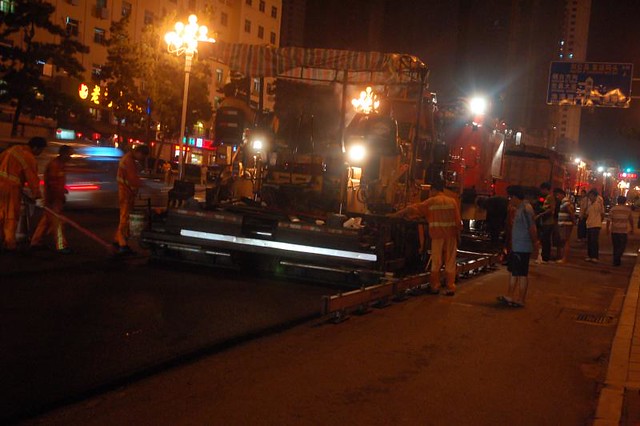
The system consists of many big machines, lining up for about 200 meters. It completely automated the work to pave a new Asphalt road. The whole army of trucks moved slowly, but after them, the old broken Asphalt is turned into new and ready to use road.
This is how it works.
The machines on the trucks at the front use fire to burn the existing asphalt surface of the road, to make it soft.
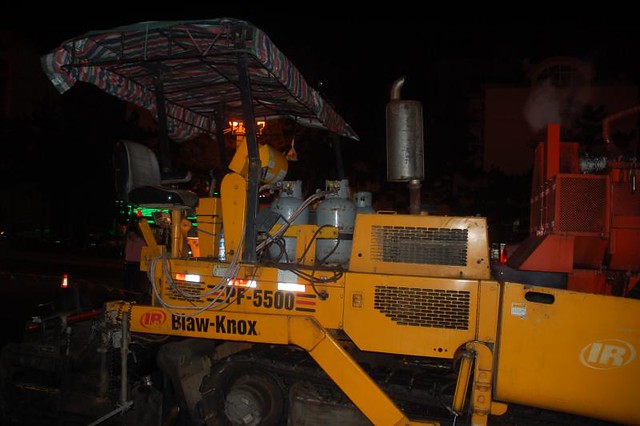
Then a big machine dig the old asphalt out, and put it into the middle of the road.
The old asphalt will be mixed with some new.

The mixed raw asphalt will be transferred to the top to continue to heat.


Then it will be put into the road again and heated on the road.

Finally, a road roller will be responsible to pave the whole road.

Look – shining new road is ready!

They work on one lane at a time. After few hours, the whole road is ready, and will be opened to traffic the second day.
Do Travelers Feel People are More Friendly?
I had a conversation with a participant of Fortune Brainstorm Conference about his recent visit to Asia, namely, Thailand, and China. He was filled with exaggerated excitement about the places he just visited. “I was overwhelmed by how friendly people are. Hey man, you just cannot imagine how friendly they are”.
Hmm Is it true that travelers feel people are friendlier in foreign countries?
For me, for example, I genuinely feel people in the States are very friendly, and people in Sanya, Lijiang, or Daocheng are friendly to me. According to my personal experience, the statement seems to positive. There are for sure cases when people get extremely frustrated during the trip or mistreated, generally, people tend to agree that they love the people they meet when they are traveling. Why is that? How so?
Is it because that, when we are traveling, we are a nicer person ourselves? We live more in the present, instead of captured by the tendency to ignore people, and things around us. I cannot imagine smiling to everyone in a crowded metro cart, and I even cannot imagine smiling every time I see Wendy. However, when we are traveling, our heart is so open that we would rather be nicer to people around us, just for the sake of a better travel experience for ourselves. In return, most of the people will find travelers are often easier to handle.
Is it because the type of people we meet? When we travel, most of the people we meet are in the travel industry. Hotels, buses, taxis, gatekeeper of tourism places Their professions are to be friendly, and make it a good experience for their customers – the travelers. I would say, they are in a happy industry themselves, with daily chance to meet with nice travelers (as I described in my previous guess). Altogether, that is a different world from our current daily routine.
Is it because the time? Time plays a role in people’s mood. I basically enjoyed every trip I had in the bay area, until one day, I was caught in a trafic jam. I was driven made by the slow moving of cars on CA-237 to Miltipas, CA. Then I felt people are not nice. I feel the anxiourity of the drivers around me. It was then that I realized my experience of the area is always in the non-rush hours. Travelers are different annimals. They don’t follow the 9 to 6 rymth of the city. When everyone is rushing into the downtown with barely cleaned face, and being hungry because they didn’t have the time to have breakfast yet, the travelers, in the contrary, is already well fed with nice continental breakfast (think about the berries, and omlette!), and on a nice coach to a place 50 miles away from the city. That makes huge difference to how people feel about the city, and the people.
There are many reasons that travelers feel people around them are friendlier, and I guess that is one of the reasons why people travel – to explore something new, and better than our current lives.
Why People Travel
I asked this question again and again, why people love to travel.
Find new things?
No matter how small it is, from an electronic plug that is different from those in our own country, to a breakfast that offers something you seldom eat in home, the difference reminds us that we are in a different world. Nothing can be more boring when you arrive in a place but you really cannot tell any difference from your home.
My visit to Aspen leads me to recognize a special type of tree – Aspen. That types of tree with white and smooth body, and heart shape small leaves. I got one leaf and put it into my Moleskin notebook. I am not saying that there is no Aspen in my city (Shanghai), or in my country (China), it is not something in my daily life. Without visiting that small town, I may never observe and appreciate, and even recognize that special tree. Ironically, if I run into a another village with many Aspen trees surrounding it, I mean mistakenly feel bored, since it is like a place I have visited 6000 miles away.
During our travel, we need to discover things that remind us that we have set feet to a new land. Nothing can be more exciting than people speaking of different languages, especially those you don’t understand.
There Must be Something New!
It is boring (although efficient) to have lunch in a McDonald’s in another country. The only compensation in a McDonald’s to a traveler is, if there is any, the different settings of those particular restaurants. For example, I paid special interest in a tag line on the self-service coke vending machine stating: “Refill only for dine-in customers”. I admit I never saw this before, and that made my visit to the international food chain.
There are something so unique to a region that it can be the name card picture of the city/country, like the skyline of Pudong in Shanghai, or the Tiananmen/Great Wall in Beijing, or the the curved uphill section Lombard Street/Golden Gate Bridge in San Francisco, or the Eiffel Tower in Paris. They are the landmarks and must see. Why? Because collectively, nothing can reminds people where they are, and how different it is from the daily life and the “boring” town they just escaped from. However, really good travelers enjoy much more than that. Admittedly, some places are more interesting than others in both the numbers of things you will notice (like a westerner arrives in Toyoko), or stronger in impression (like the Grand Canyon that can no longer be classified as just a canyon), most travelers can find difference along the way they travel, and throughly enjoy their trip. That is the sensation we need to build in ourselves, to allow us to enjoy the world of difference.
